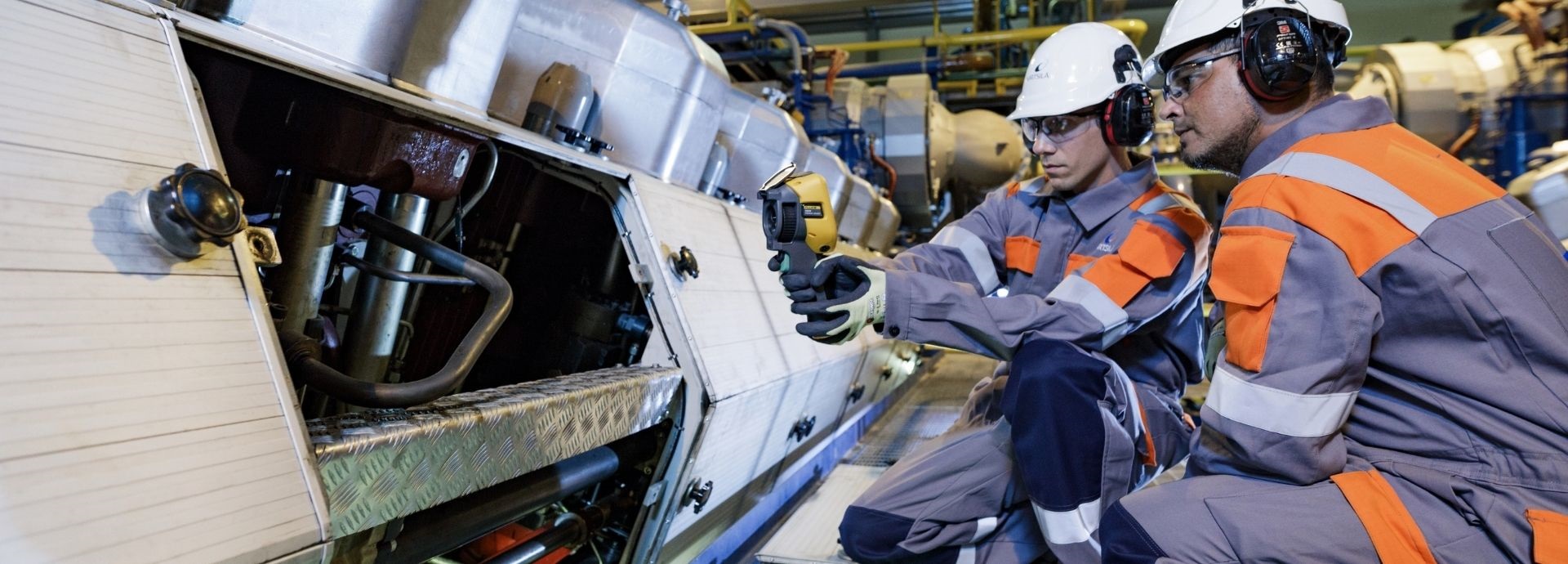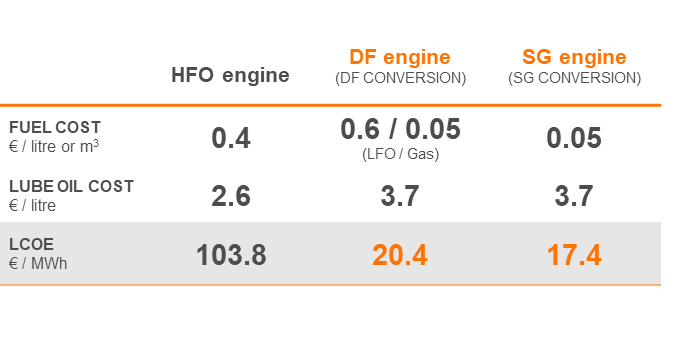

Converting engines to run on gas
– and beyond
As gas grids expand and emission levels continue to tighten, conversion to natural gas is an increasingly viable alternative for power plants. Wärtsilä engines are flexible and easily adapted to using gas as a primary fuel, helping to cut operational costs and exhaust gas emissions while increasing fuel flexibility. Gas conversion is one key feature in future-proofing power plants, as it enables transition to synthetic, sustainable fuels in the future.
Moving forward with future-proof options
Why consider a gas conversion?
As natural gas is both attractively priced and efficient, converting an existing engine to operate on gas offers significant economic and environmental benefits. Gas also offers you increased operational flexibility as other fuels can still be used if needed. A gas conversion helps to future-proof your plant by allowing you to transition to synthetic fuels at a later date and enables integration of renewable energy sources by providing reliable balancing.

A cost-optimal business move
Case example: the impact of fuel type and technology on levelised cost of energy.
The example demonstrates the impact of technology and fuel type on levelised cost of energy. The example is based on a 100 MW power plant, with six W18V46 engines. The actual values are not directly applicable for any power plant, but will depend on several variables and factors.


Reduced power plant emission levels
Case: Delimara gas conversion
Shanghai Electric Power reduced both electricity production costs and emission levels at their Delimara 3 Power Plant in Malta as eight Wärtsilä HFO-fuelled engines were converted to run on natural gas including installation of the new UNIC C3 engine control system. This means a lower heat rate for the engines, increased efficiency, higher power output capacity, and lower emissions, in other words, reduced operational costs.
News
Wärtsilä Optimised Maintenance agreement supports growth ambitions of a privately-owned Nigerian supplier of energy to the national grid
The technology group Wärtsilä has signed a long-term Optimised Maintenance agreement covering power plants in three locations owned by Paras Energy, a 100 percent privately-owned Nigerian energy provider. The aim of the agreement is to ensure the plants’ continued high levels of availability, reliability and efficiency, while providing important cost predictability for future budgeting purposes. The agreement was booked by Wärtsilä in the second quarter of 2021.
The plants covered by the five-year agreement are operated with Wärtsilä 34SG gas-fuelled engines producing a combined total output of approximately 132 MW. Based on an average connected capacity of some 6,5 kW for each Nigerian home, this will represent the annual consumption equivalent of close to 20,300 domestic households.
“We have worked successfully with Wärtsilä for twelve years, during which time we have developed a strong spirit of mutual respect and trust. Until now we have managed and maintained these plants ourselves, but as we grow and expand our operations we are convinced that Wärtsilä’s professional approach will provide the support needed as we develop our core business,” said Yashwant Kumar, Managing Director, Paras Energy & Natural Resources Ltd.
“This tailored agreement will strengthen our long-standing partnership with Paras Energy. It is another example of marrying our world-class expertise and experience with state-of-the art digital technology to create unparalleled customer value. We are excited and honoured to take this step with an energy thought leader like Paras Energy,” explained Björn Ullbro, Vice President, Africa & Europe, Wärtsilä Energy.
Paras Energy is a privately-owned independent energy supplier connected to Nigeria’s national grid. Availability of the generating assets is, therefore, a key necessity and was a notable factor in the decision to sign the Optimised Maintenance agreement with Wärtsilä. The agreement has been specifically tailored to meet the needs and growth ambitions of the customer.
In 2009 Paras Energy decided to benefit from the advantages offered by the Wärtsilä gas engines rather than using gas turbine technology, which was at the time standard in Nigeria. Today, this is well in line with the Nigerian Federal Government’s integrated energy mix targets. The Nigerian Sustainable Energy for All (SE4ALL) action agenda in the 30:30:30 vision document outlined a target of generating 30 GW of power by 2030, with 30 percent from renewable energy sources.
The key benefits of the Wärtsilä technology include flexibility and the ability to quickly adjust the load in response to supply fluctuations from renewable energy sources. Gas engine power plants can be sized to meet the requirements of different needs, such as those of manufacturing industries, cities, or local microgrids. Furthermore, the Wärtsilä solution features low water consumption, which is an important consideration in view of Nigeria’s long dry seasons.
Wärtsilä has had operations in Nigeria since 2006 and its presence in Nigeria remains strong. Today, the number of personnel employed is close to 90. The total installed capacity in the country is 667 MW, of which about 70 percent is under service agreements. In the African continent, Wärtsilä has an installed footprint exceeding 7000 MW.
Learn more: Wärtsilä Lifecycle solutions
Media contact for more information on this release:
Mirja-Maija Santala
Manager, Marketing & Communications
Wärtsilä Energy
Mob: +358 400 793 827
mirja-maija.santala@wartsila.com
Image: The Wärtsilä service agreement helps Paras Energy to ensure high levels of availability, reliability and efficiency, and to provide cost predictability for future budgeting purposes. © Wärtsilä Corporation
All Wärtsilä releases are available at https://www.wartsila.com/media/news-releases and at http://news.cision.com/wartsila-corporation where also the images can be downloaded.
Wärtsilä Energy in brief
Wärtsilä Energy leads the transition towards a 100% renewable energy future. We help our customers in decarbonisation by developing market-leading technologies. These cover future-fuel enabled balancing power plants, hybrid solutions, energy storage and optimisation technology, including the GEMS energy management platform. Wärtsilä Energy’s lifecycle services are designed to increase efficiency, promote reliability and guarantee operational performance. Our track record comprises 74 GW of power plant capacity and more than 80 energy storage systems delivered to 180 countries around the world.
https://www.wartsila.com/energy
Wärtsilä in brief
Wärtsilä is a global leader in smart technologies and complete lifecycle solutions for the marine and energy markets. By emphasising sustainable innovation, total efficiency and data analytics, Wärtsilä maximises the environmental and economic performance of the vessels and power plants of its customers. In 2020, Wärtsilä's net sales totalled EUR 4.6 billion with approximately 18,000 employees. The company has operations in over 200 locations in more than 70 countries around the world. Wärtsilä is listed on Nasdaq Helsinki
www.wartsila.com





